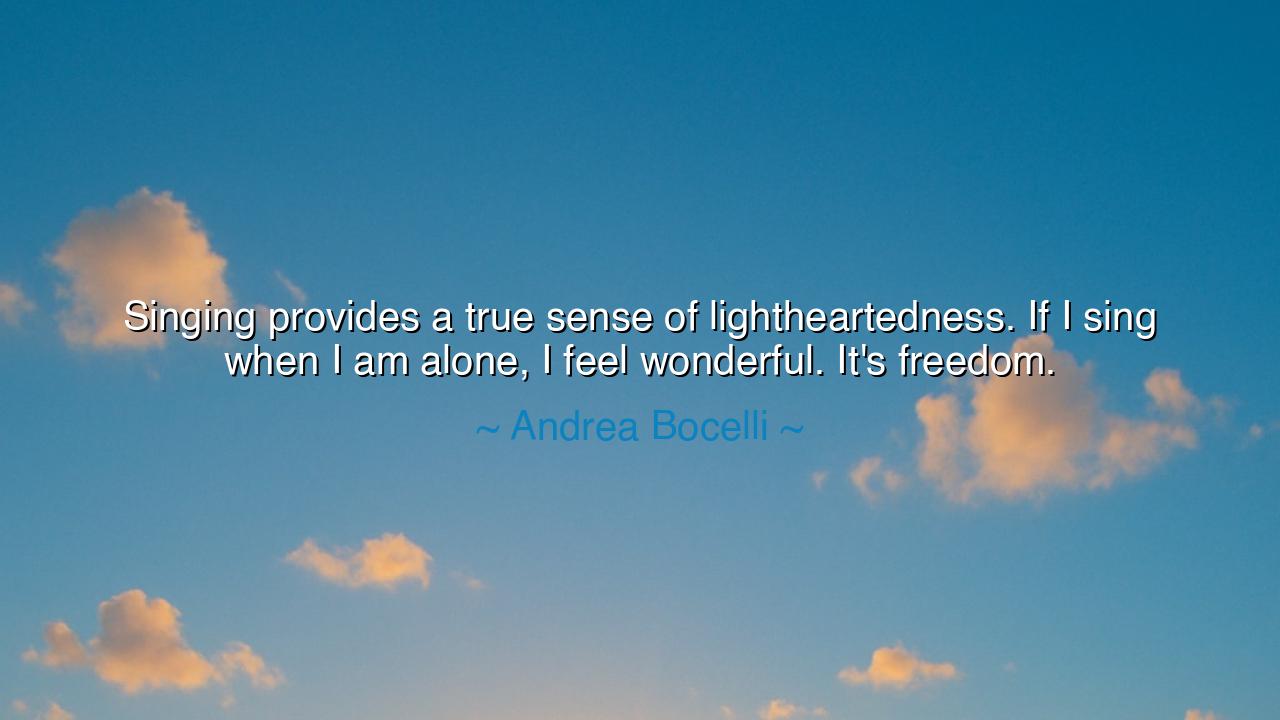
Singing provides a true sense of lightheartedness. If I sing when
Singing provides a true sense of lightheartedness. If I sing when I am alone, I feel wonderful. It's freedom.






“Singing provides a true sense of lightheartedness. If I sing when I am alone, I feel wonderful. It’s freedom.” — thus spoke Andrea Bocelli, the blind tenor whose voice has lifted hearts across the world. In these few words lies a truth both intimate and universal — that music, especially when sung in solitude, is not merely art but liberation. Bocelli, who has sung before kings and commoners alike, speaks here not as a performer on the grand stage, but as a soul returning home. His words remind us that true joy and freedom are not found in applause or fame, but in the quiet communion between the heart and its song.
Born in Italy and blinded by an accident at age twelve, Andrea Bocelli was not destined for an easy path. Yet from childhood, he found solace and strength in music. When he says that “singing provides a true sense of lightheartedness,” it is because for him, music became the bridge between darkness and light. Alone, when the world is hushed and unseen, he sings — not to be heard, but to be whole. In that sacred solitude, every note is a breath of freedom, every melody a reminder that the spirit cannot be imprisoned by circumstance.
To sing when one is alone is an act of courage and purity. There is no audience to please, no critic to fear — only the voice of the self meeting the vast silence of the universe. It is a form of prayer, though no words may name the divine. Bocelli’s “freedom” is not escape; it is release — release from doubt, from the weight of expectation, from the noise of the world. In song, he touches something eternal. The act of singing becomes a mirror for the soul: what is hidden rises, what is burdened is lifted, and what is broken begins to heal.
This truth is not Bocelli’s alone. In every age, the wise have known that music is a sacred medicine for the spirit. The philosopher Pythagoras taught that harmony was the essence of the cosmos, that every soul resonates like a string in the grand symphony of being. And the Psalms of old, sung by shepherds in lonely fields, were born from the same impulse — to turn solitude into song, sorrow into praise. Even the warrior David, before he was king, found peace in his harp when the shadows of fear pressed close. Like Bocelli, they knew that singing is the soul’s declaration of freedom — the voice saying, “I am still alive, I am still whole.”
In this way, Bocelli’s words also remind us of the sacred power of solitude itself. The modern world fears being alone, mistaking it for emptiness. But to the artist, the philosopher, and the seeker, solitude is not void — it is space. It is the open air in which truth is heard again. When Bocelli sings alone, he teaches us that to be with oneself is not a punishment but a privilege. For only in such quiet moments can we rediscover the music that has always lived within us, waiting to be sung.
And yet, Bocelli’s joy in solitude carries a lesson for us all: freedom is not granted by the world — it is found within. We may be surrounded by noise, bound by duties, or trapped by grief, but when we lift our voices, even softly, something in us breaks free. To sing — even if only to the empty air — is to affirm life, to say, “I am still here.” That act, however small, defies despair.
Lesson: Find your song. Whether through music, art, or the simple act of gratitude, give voice to what stirs within you. When you are alone, do not fear the silence — fill it with the sound of your spirit. Sing not for the world’s approval, but for the joy of being alive. In those moments, like Bocelli, you will know the taste of true freedom — the kind that no cage, no darkness, no silence can ever take away.
Thus, Andrea Bocelli’s words shine as a hymn to the soul: “If I sing when I am alone, I feel wonderful. It’s freedom.” The lesson is eternal — that the purest form of joy is not found in the clamor of applause, but in the harmony between one’s heart and the quiet universe. To sing alone is to stand in the light of one’s own being and to find, at last, that one’s voice — fragile yet divine — is enough.






AAdministratorAdministrator
Welcome, honored guests. Please leave a comment, we will respond soon